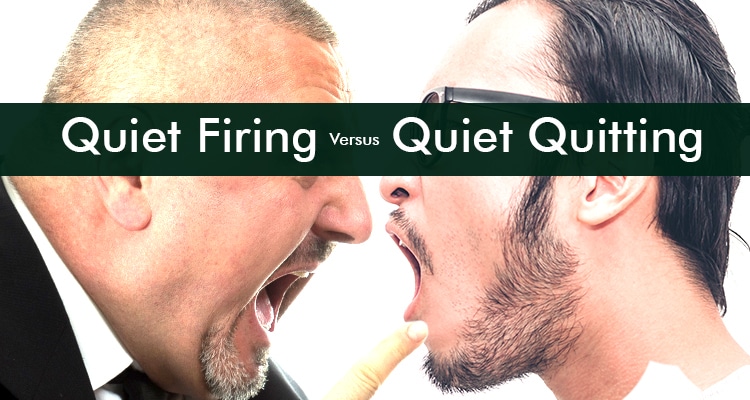You’ve all probably heard of quiet quitting. This refers to simply doing the bare minimum to accomplish your tasks without resigning. Its purpose is to regain a healthy work-life balance and improve mental health.
But did you know there is something similar to this called quiet firing? If not, here’s what you need to know.

What is It?
In a nutshell, quiet firing happens when employers mistreat employees to the point where they’re driven to resign on their own. This could be done deliberately or unintentionally.
Despite sounding new, this concept has been happening for some time. In a recent LinkedIn poll, more than eighty percent of employees revealed that they’ve seen quiet firing at work.
Examples include passing you over for promotions, giving you extra responsibilities with no pay increase, and not giving you appropriate feedback and recognition.

What’s the Difference Between Quiet Firing and Quiet Quitting?
The difference between quiet quitting and quiet firing is that the former is done by employees while the latter is done by their employers.
Another difference is that quiet quitting doesn’t mean employees will leave their jobs. It just means they won’t overexert themselves at the risk of experiencing burnout.
Contrast this with quiet firing, where employers intentionally or unintentionally compel their employees to leave by mistreating them.
Despite their differences, experts say that there is a connection between quiet firing and quiet quitting. Because employers mistreat their employees, the latter are less inclined to do their best and instead go for the bare minimum.

Signs Of Quiet Firing
Here are some telltale signs to watch out for:

Your Employers are Consistently Passing You Over for Promotions and Salary Increases.
Despite your accomplishments, nothing is ever enough for your boss. They never promote you to a higher position nor increase your salary, and don’t furnish you with a reason why they do this.

They Never Give You Meaningful Feedback.
One of the best ways to know if you’re improving in your work or not is through constructive feedback from your bosses. By denying feedback or revising your work without notifying you, they prevent you from growing and improving your work.

Your Boss Does Not Give You Opportunities to Grow Your Skills.
Another telltale sign of quiet firing is that your work may feel too easy and repetitive lately. You’re not feeling challenged by your tasks anymore, and some of them may be better suited for more junior employees.

Employers are Withholding Information You Need to Succeed at Work.
Another red flag is a lack of transparency between you and your employers. If your boss doesn’t trust you, why should you trust them in turn?

Your Boss Avoids Interacting With You
Missing one or two meetings with your boss due to unforeseen circumstances is understandable. But if they cancel on you all the time, that’s when it becomes a problem.

Your Boss and Co-workers Pick on You During Meetings.
A little banter between you and your co-workers is perfectly normal. On the contrary, it shows that they’re comfortable working with you and that you’re part of the team.
However, there’s a difference between friendly teasing and your co-workers picking on you. If your boss and co-workers are constantly making you uncomfortable and feeling left out, consider looking for another job.

Nobody Takes Your Ideas Seriously.
Respect goes both ways. If your accomplishments go unnoticed and nobody’s listening to your opinions, it’s a surefire sign that your boss wants you out.

What to Do When This Happens to You
Communication is essential when dealing with quiet firing. Before you decide to quit, communicate with HR first and file a complaint about what’s happening. You can also try talking to your boss about their behavior and how it’s negatively affecting you.
If all goes well, this issue will be solved, and you won’t have to send a resignation letter to your boss. However, if things remain the same, then it might be time for you to resign and look for better opportunities elsewhere.

Becoming Aware of the New Threat in the Workplace.
Although it sounds similar, and is related to quiet quitting, quiet firing is a lot more sinister.
Here, employers try to convince you to leave by mistreating you until you resign. It’s workplace bullying in a more subtle and insidious form.
With telltale signs such as the ones mentioned above, you can spot this kind of abuse. Familiarizing yourself with these signs can help you protect yourself from workplace bullying.
If you’re looking for online work in a healthier environment, Remote Staff is here to help.
We ensure our clients will treat their remote contractors right and provide all the support they need to ensure a healthy work relationship between them.
So what are you waiting for? Check out our list of available jobs today.

